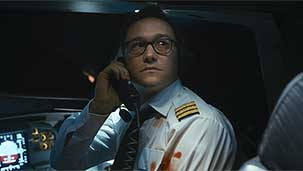There’s a reason every airline captain introduces themselves over the intercom before takeoff.
It’s too easy to forget about the human beings involved in the miracle of flight, especially with so much technology between said “miracle” and the very scientific act of flying an airplane. On most flights, we get a simple “hello, welcome aboard” at the start, and a “thank you for choosing us” sign-off. Every so often we’re warned about turbulence or delays. But in all cases, protocol dictates that the less said, the better.
That seems to be the approach of writer/director Patrick Vollrath throughout his feature film debut 7500. As an Oscar-nominated short filmmaker, Vollrath has clearly learned how to do more with less. On the surface, that might only register with the audience in how he confines the entire film to the cockpit on a commercial airliner. Single location shoots are less a gimmick than a sub-genre now, so audiences have become primed to appreciate the storytelling under such self-imposed restrictions.
But in the same way you were tasked with limiting what was said on the airwaves of the set itself, Vollrath also limits what the audience hears throughout the film. For example, there is no score. At all. It’s not even something I realized until watching the credits (which feel abrupt playing over silence for the first 30 seconds or so). That’s when I noticed there was only an “end credit composer”. I only registered the lack of music at an emotional level, feeling both sparseness, but also a firm handle on the drama. The same way a pilot wouldn’t broadcast every little glitch and bump to their passengers, Vollrath trusts that the audience will feel the movement of the story without needing to audibly telegraph every emotional beat.
As the movie begins, we’re introduced to Joseph Gordon-Levitt’s co-pilot character, and his flight attendant girlfriend/baby mama. The impending drama is obvious. With a terrorist attack aboard the plane, and the men taking hostages one by one, we know a choice will inevitably come down to Levitt’s character opening the door to the cockpit, or risk having his girlfriend killed. These kinds of storytelling moves are obvious from the on-set (there are only a few in the whole film), but that doesn’t make for any less of a compelling ride. I still wanted to know how the hero would deal with this dilemma, not if he will.
I use the term “hero” loosely. Part of the appeal of 7500 is its refusal to turn into an action movie. Most of the main character’s interactions with the terrorists and passengers are through the intercom system. Though that doesn’t make his decisions any less heroic. That restraint is mirrored by all aspects of the filmmaking, resulting in a simple but effective thriller.
As a result, I felt in safe hands - even when everything went to hell.
Sincerely,

Christopher







